Researching Homelessness in Houston: A Week in Pictures
.png)
It was a good week.
Scratch that. It was a great week, accumulating interviews with homeless folks and homeless experts, surveying those on the streets, and gaining new insights into homelessness in ways (and of a volume) exceeding expectations.
So first, a special thank you goes out to the 20-some supporters who’ve chipped in to help make this journey possible. And as I write this from a pit stop on my return drive to Minneapolis, I look ahead to all that now needs to be done: analyzing the many surveys from Houston, Dallas, and Minneapolis; creating outlines for the stories to be featured in this documentary series (with the help of my writer friend David); and then editing all this footage into videos (with the help of my cousin & editor Krista and friend & video-producer Joe).
Each of these individuals are helping me for little to no compensation. But I would like to pay them whatever I can, as well afford myself more time to work on this project. So, if you so desire, please contribute to the creation of the documentary series here.
Now I’ll stop talking about what’s to come and instead share what I did this past week…
Houston
My first morning there, I drove to the location of a reported tent city—only to discover it had been disbanded by police. But there were yet a few hangers-on. So, I spoke to these guys and asked them to complete a survey:
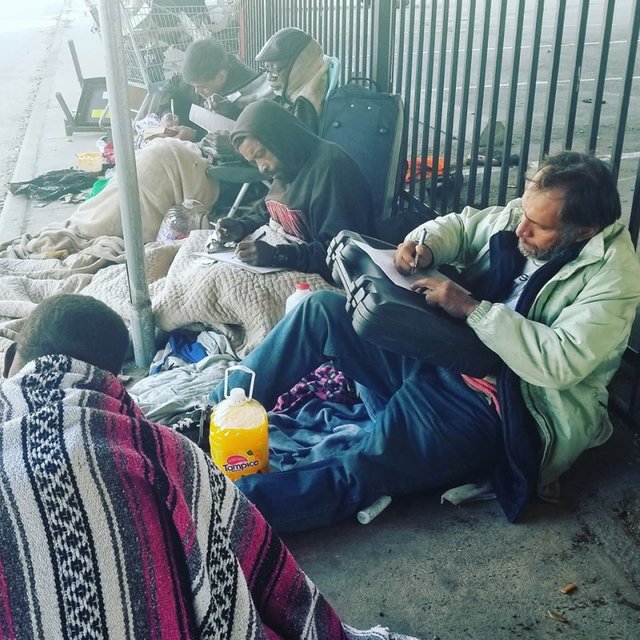
These guys then directed me to where I found a larger group of homeless folks. This group was also willing to fill out surveys. One guy was even open to being interviewed about the difficulties facing this community.
“A lot of them can’t read or write,” said this Houston man about his peers on the street.
A second man there took an interest in my work and asked to be interviewed as well. More than that, this man named Jim would tour me around to a couple of other places in the city to help me better understand the homeless situation there.
But first, he shared with me his story:
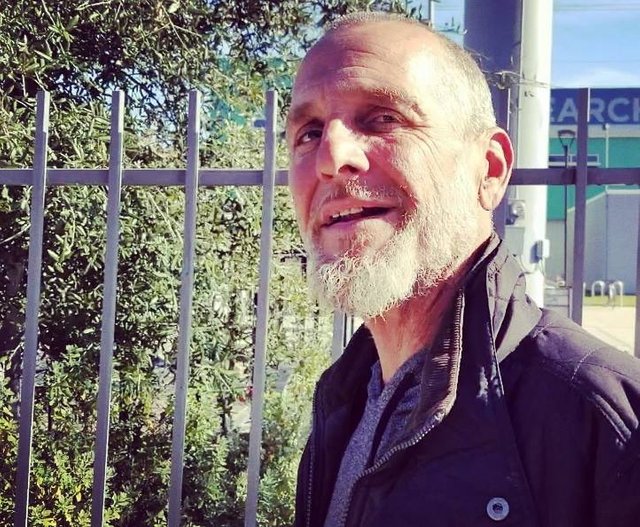
“It gets to the point where I don’t want to get my hopes up. That just crushes you even more,” said Jim. After losing his job and then his wife three years back, he ate away at his savings until penniless. Today he finds himself in a position where the pain of disappointment is too much to risk, he says. Best not to try at all.
After sharing his story, Jim took me to a small tent city in town:
“I guarantee people from the city have come through here with a clipboard,” said Jim, my Houston guide for the day.
According to Jim, a sight like the one over his shoulder above isn’t so much about neglect from the city as it is about resistance from those who remain homeless.
“Hey, I’m out here on the street. I can take it,” said Jim, speaking for those who refuse help, which Houston has been ambitiously offering in recent years.
Also, he said, “If you’re getting help from the law, you might [seen as] a snitch.”
Even when offered housing, there seems to remain homelessness. The question with what to do about such people remains to be answered. This is a question Marilyn Brown, President of Houston’s Coalition for the Homeless is trying to solve. The following day I interviewed her at the Coalition’s downtown office:
“We have housed more than 15,000 people in the seven-year span since we began this work,” said Marilyn. “At the two-year mark, a good 85-90% of the people are in still in the housing–or have been able to move on and become self-sustaining.”
Since 2011, Houston has reduced homelessness by 50% through an ambitious, coordinated effort to provide permanent housing. Marilyn explained the benefits of their “housing first” model.
It promotes the idea that a homeless person isn’t practically able to build a life until he/she has the foundation of a secure home. So, Houston has been providing them to the chronic homeless—regardless of their criminal past, whether they are sober, etc. This idea is criticized by those who point out such a system rewards behaviors that lead to homelessness (addiction, irresponsibility, etc.) and can be exploited because of this. Bringing this up to Marilyn, she simply disagrees that such concerns (though present) outweigh the benefits.
“Housing first” is considered across America to be a Progressive approach to the homeless crisis. Yet the Coalition in Houston also has taken a more conservative stance in advocating for law enforcement to disband large tent cities. They were, in fact, a reason why the tent city I sought out my first morning was no longer there. The Coalition’s stance comes from the fact that residents in tent cities are at risk of the activity within them. Plus, residents are less likely to pursue the Coalition’s housing and service programs.
In all, I gathered that Houston has taken a pragmatic, carrot-and-stick approach: generous programs to help the homeless while steering such individuals into their system. This combination struck me in its sensibility—as well as how it contrasts the approach with which Minneapolis has addressed its tent city.
I’ll be fleshing out such points in my documentary series.
Finally in Houston, I visited one of the new housing complexes built for the homeless. There I met Reginald, who opened up about the activity inside this building of dormitory-style apartment units.
“If that person wants nothing out of life, he’s gonna come here and do nothing. If a person wants to succeed, he’s gonna, you know, grow and get better.”
Reginald, who had been homeless about three years, now lives rent-free in the building behind him. He said the quote above when asked how his fellow residents are using this new chance to build a life. Is it used as a stepping stone or a place for people to party and whatnot?
As he indicated, and as I’ve seen in Minneapolis, the results are mixed. Many here, according to Reginald and others I asked in Houston, do use their new home to build a life. At the same time, he said, “A few people have brought the street mentality indoors.” Some of whom “have been kicked out for fighting and drinking and things like that.”
This, I believe, is the crux of the issue of whether such initiatives are the best way forward. Thus, it’s one I’ll examine in detail in this documentary series on homelessness in America.
Next week, I’ll share the equally-productive two full days I spent in Dallas…
Until then, I’ll be returning home, returning to the Minneapolis tent city, and getting to work on all this material. If you’d like to support this project, you can contribute here.
thank you for caring,
-Brandon
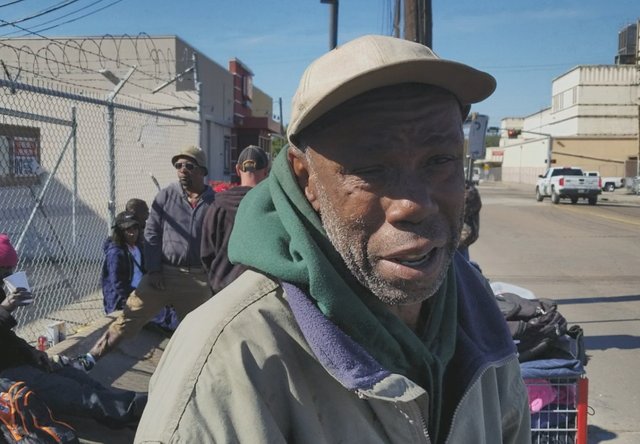
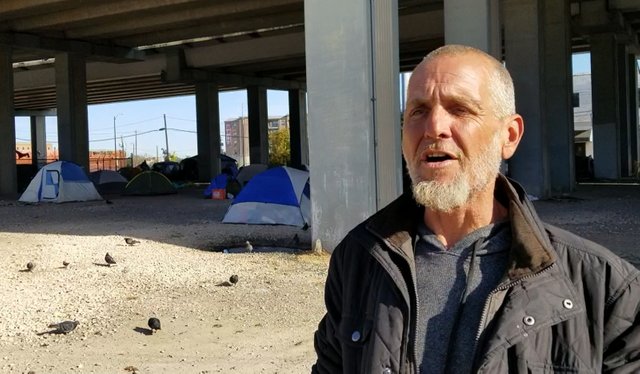
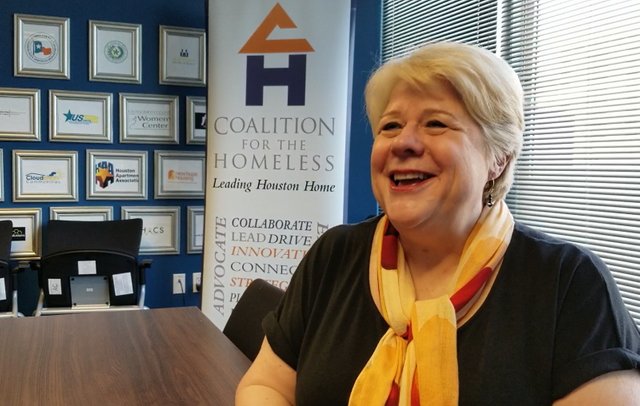
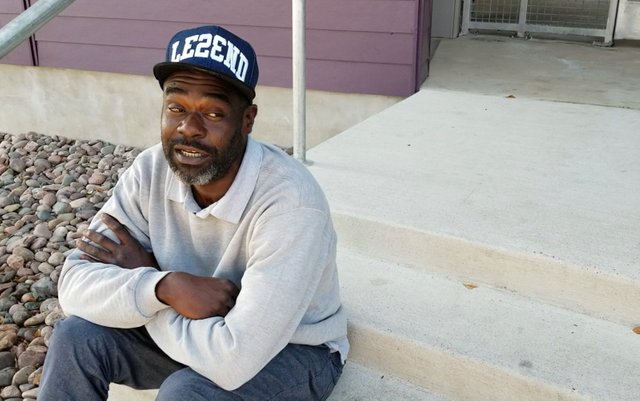
really interesting project @fedoraonmyhead, hope that it will contribute something for the development of people and municipals environment in the world by sharing this. I think that house is not one of the most important thing s in human life like I learned in the school. but there's a;ways interesting to know, why people could be homelss and how the community and governement anticipate the situation. I hope that your project will succeed and you find what you looking for through the project too.
found your post through @matkodurko entry post in the pay it forward contest this week and Wish you continued success!
@cicisaja thank you for the comment! Yes, i am editing the videos this week. I also hope many cities will watch it:) I'll share it here on Steemit.
Prediction is so hard, but explaining how something happened is easier (and can be helpful, too). I'm discovering more and more about the causes for this homeless crisis. I'll share them in my documentary and am also happy to chat more about them here, if you like.
I just wondering why they're homeless and how they spend their days, even in my country we have homeless too, and one in my neighourhood, I found out from his story that he just too lazy and happy to live like that, as if he never care about his future. but maybe some people have no option but living in the street. do you think that financial crisis always the main cause taht push people become homeless in usa?
@cicisaja I don't think the financial crisis was a big factor. I think a larger cause is making more Americans to not care as much about having a "normal" life in society. They "check out" -- like the guy in your neighborhood. I think many factors (economic, drug addiction, cultural changes, and policy) have worked together toward this cause. I also think there are specific issues with black and Native Americans communities that add to the problem of homelessness.
Wow thank you so much for doing this in the first place, and sharing it here. I first read about a similar housing oriented approach to homelessness in Utah, another place where you wouldn't necessarily think of progressive attitudes. Very interested to read more about what you are doing, in particular the survey. Cheers
@carlgnash thanks you, and yes, Utah was a key founder of the housing first model. I wouldnt call it "Progressive" just smart problem-solving, and it works there (I believe) because they had been more conservative leading up to this. Similar to Houston. In a place like Seattle or even my city of Minneapolis, housing the homeless is more difficult. It has to do with culture. Ill explain it all in my series:) Or, heck, Im happy to do so here, as well, if youre interested in hearing more.
I know that the rational behind housing first is more economic than anything else but I would still describe a housing first approach as progressive even if the actors are on the conservative political spectrum. I am in Eugene and political climate here probably pretty similar to Seattle, although at the city government level there has been coordinated warfare on homeless people downtown for several years now with a series of poorly thought out and implemented regulations aimed at keeping homeless people out of downtown. E.g. banning all dogs (except service animals) from downtown was a recent attempt with the logic that many homeless people have dogs. That one was quickly abandoned. Another recent one was banning sleeping on public property period, at any time of day or night, I believe that one was actually challenged in court (or maybe just the threat of lawsuit) but was quickly dropped. EDIT I have to add on the sad side that there is also an established and well documented subculture within the police here that engage in homeless beating as sport.
It seems indicative that a city as friendly toward the homeless as Seattle has been would be passively-aggressive toward them. It also seems this is the problem with ill-defined policy and approach. Houston is actually very generous with the homeless in providing dorn rooms. But they also profess to be clearer on drawing the line on what theyll allow the homeless to get away with. I wouldn't expect much to change regarding homelessness in Seattle and other cities led by similar ideology. The culture nurtures dependency. I appreciate the comment. I didnt know about those ordinances passed in Seattle.
No the city ordinances were in Eugene, Oregon (my area). You mentioned Seattle and I think (speaking generally) Seattle and Eugene are pretty similar politically, but I have no knowledge about city level ordinances there.
@carlgnash Oh, got it. Okay, thank for the clarification!
Firstly, thank you so much for what you're doing @fedoraonmyhead! Such an honorable and much needed task; so many complain of the "homeless situation", but very few do anything to help. I applaud you!
Your documentary is taking on a monumental question, where there's no real answer, but it must be very interesting seeing first hand how different cities are tackling the problem, but more importantly, you're bringing human faces and their stories to it; so much more compelling and memorable, than simple housing statistics.
I found your post because @matkodurko featured you in his Pay it Forward Curation Contest entry, but I'm also submitting this to c-squared to give you a bit more advertisement and support. Good luck!
@lynncoyle1 thank you for the kind words and for the submission! Yes, I also feel the project is worthwhile because it addresses a huge social to be solves, and it puts faces on this problem. I'm thrilled you and others here appreciate this effort!
You are most welcome @fedoraonmyhead! Keep up the valuable work :)
This is a wonderful project that you have taken on. There are so many factors that come into the homeless situation. Mental illness and substance addiction are such huge factors. Good luck!
@melinda010100 absolutely, I've come up with about six key factors causing the rise of homelessness. Two you mentioned. Economy, community, and policy are some others I'll explain in my series. Or, I'm happy to explain further here, if you like:)
I'll be interested to see your series!
What an amazing post for an awesome project that you're doing! I'm so glad that @matkodurko featured you in his curation contest entry so that I could find such awesomeness. I hope you get plenty of support and help answer some of the questions people still have regarding homelessness.
I've been through this cycle a couple of times, the most recent was the most challenging with young children and a time-limit at the homeless shelter - in an area with inadequate low-income housing. I had to travel from Spokane to Wyoming just to find housing - I was lucky to receive help from my church or I couldn't have got there.
In my experience, there's lots of help - as long as you've got a car, the right job skills, addictions, etc. In other words, if you don't fall into specific categories, there's not much. Lots of free food, clothing, help finding work, but little help with housing.
@viking-ventures I'm glad to hear you were able to get back on your feet. Many homeless folks aren't willing to move. You were, and it sounds like it has paid off in this new city. I hope to find other ways, as well, to decrease the total number of homeless.
It is an impressive job and your post is unbelievable. Everywhere and all the time they make us see that things like that can only happen in countries like mine, like Venezuela and in underdeveloped countries.
Thanks for sharing this info!
@ylich yes, different countries have their own situations, but there is more overlap than most peiple realize. And all societies rise and fall...
This post was shared in the Curation Collective Discord community for curators, and upvoted and resteemed by the @c-squared community account after manual review.
@c-squared runs a community witness. Please consider using one of your witness votes on us here
Awesome job you are doing. Just amazing! Thanks for this initiative!
PS: I've found your post after @matkodurko featured you in his entry for the Pay It Forward Contest
Glad you like the videos! Stay tuned for more:)
I'm so grateful to have found appreciative readers on Steemit.
Me too. Good job @fedoraonmyhead and thanks for discovering it for us @matkodurko :)
@phortun Wow, great blog you have! I am happy to have found you. Thanks for commenting and supporting my work:)
Your post was featured in an entry into @pifc's Curation Contest:Week 36. Posts are selected because the entrant felt you are producing great content and deserve more attention (& rewards) on your post. As such your post has been upvoted and will be visited by other members of the PIFC Community.
We are always looking for new people to join our curation efforts. This is a great way to meet new people and become part of a community that focuses on helping one another.
Want to promote a post for free and have a chance to find some other great content? Check out this week's Pimp Your Post.
The Pay It Forward community also has a Discord Channel if you are interested in learning more about us.
It is sad people have to live like that. I really hope we can do more to stop it.
Yeah, the "high risk, high reward" nature of America is really apparent these days.